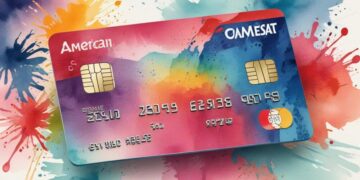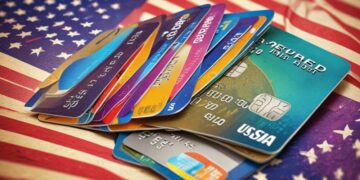The Impact of Credit Cards on Online Shopping: Advantages and Disadvantages

Introduction to Credit Card Usage in Online Shopping
In today’s fast-paced digital age, credit cards have become a staple of online shopping. They offer convenience, speed, and access to a vast array of products at our fingertips. However, with great power comes great responsibility. Understanding the advantages and disadvantages of using credit cards for online purchases is essential for making informed decisions. Here are some key aspects to consider:
Advantages of Using Credit Cards for Online Shopping
- Instant Purchase Capability: One of the most compelling advantages of credit cards is the ability to make purchases instantly. Instead of waiting to save up for a desired item, customers can make the purchase right away, allowing them to enjoy their products without delay.
- Rewards and Cash-Back Opportunities: Many credit cards come with reward programs that offer points or cash back on purchases. For example, a card may provide 2% cash back on all online purchases, accumulating savings that can make a significant difference over time. Savvy shoppers can leverage these perks to gain benefits such as travel miles, discounts on future purchases, or even gift cards.
- Enhanced Security Features: Security is a major concern when shopping online, and credit cards often come equipped with enhanced security features. Zero-liability policies and fraud detection processes protect consumers against unauthorized charges. By using a credit card rather than a debit card, shoppers can shield their bank accounts from direct access, adding an extra layer of security.
Disadvantages of Using Credit Cards for Online Shopping
- Potential for Overspending: The convenience of credit cards can sometimes lead to impulsive buying. It’s easy to lose track of spending when multiple purchases are made online without immediate consequences. This can quickly result in unexpected debt that can be difficult to manage.
- Interest Rates on Unpaid Balances: Failure to pay off balances in full can lead to high-interest rates accumulating over time. Many credit cards in the U.S. charge interest rates that can exceed 20%. A single late payment can spiral one’s financial health into a precarious situation, making it essential to budget wisely when using credit.
- Risk of Fraud and Identity Theft: Despite enhanced security features, the risk of fraud remains prevalent in online shopping. Cybercriminals are constantly employing sophisticated tactics to steal personal information. Therefore, vigilance is crucial. Regular monitoring of account statements and utilizing secure payment platforms can help minimize these risks.
As you navigate your online shopping journey, it’s important to be empowered by knowledge. By understanding both the benefits and drawbacks of credit card usage, you can take charge of your financial health. Embrace the world of online shopping with caution, make conscious choices, and watch how you can benefit from the myriad of opportunities that credit cards offer. Understanding their true impact can lead to a more fulfilling and responsible shopping experience.
In conclusion, the digital marketplace offers exciting prospects, and credit cards can be a powerful ally when used thoughtfully. Equip yourself with the understanding necessary to shop wisely, balancing convenience with responsibility. By doing so, you can enjoy the multitude of benefits while safeguarding your financial future.
Unlocking the Benefits: Embracing the Advantages of Credit Cards in Online Shopping
As we navigate the vast digital marketplace, the advantages of using credit cards for online shopping are numerous and enticing. Understanding these benefits can inspire informed choices that foster a sense of financial empowerment. Let’s delve into the ways credit cards elevate the online shopping experience, making it both efficient and rewarding.
Convenience and Flexibility
In a world that thrives on immediacy, credit cards offer unparalleled convenience. With just a few clicks, a consumer can purchase anything from everyday essentials to luxury items without leaving the comfort of their home. This instant access means that shoppers can acquire desired products when they need them, eliminating the limitations imposed by traditional banking and saving methods. Imagine browsing through your favorite store online, seeing that perfect pair of shoes, and buying them instantly without the wait—this is the beauty of credit card use.
Harnessing Rewards and Benefits
Another significant advantage lies in the reward programs associated with many credit cards. These perks can turn everyday purchases into opportunities for savings and indulgence. Here are some popular benefits that credit card users often enjoy:
- Cash Back: Many cards provide a percentage back on purchases, allowing for a saving effect that adds up over time.
- Travel Miles: For those who love to explore, credit cards that reward travel can help accumulate miles or points redeemable for flights and hotel stays.
- Special Promotions: Certain credit cards may offer exclusive discounts and early access to sales for cardholders, enabling savvy shoppers to save even more.
By maximizing these rewards, consumers can enhance their shopping experiences while also reaping financial benefits. Over time, these seemingly small savings can translate into significant rewards, elevating the lifestyle and financial management of individuals or families.
Security and Consumer Protection
In today’s internet-savvy world, security is paramount. Credit cards often come equipped with advanced protection features designed to keep users safe from fraud. Zero-liability policies ensure that if unauthorized transactions occur, the cardholder is not held accountable. Furthermore, many credit cards offer fraud detection services that track unusual spending behavior and alert users in real time if something seems amiss. This added layer of safety provides peace of mind—allowing consumers to shop with confidence, knowing their financial information is safeguarded.
In summary, while the digital marketplace presents valuable opportunities for consumers, understanding the advantages of credit card usage is vital to navigating this terrain wisely. The convenience, rewards, and security associated with credit cards can transform online shopping into a more fulfilling experience, fostering a relationship with finances that balances enjoyment with responsibility.
Navigating the Pitfalls: Acknowledging the Disadvantages of Credit Cards in Online Shopping
While the allure of credit cards can significantly enhance the online shopping experience, it is also crucial for consumers to recognize the potential downsides. By understanding these disadvantages, shoppers can make more conscious decisions that align with their financial well-being.
Debt Accumulation and Mismanagement
One of the most pressing issues associated with credit card use is debt accumulation. The convenience of instant purchases can lead some individuals to overspend without fully accounting for their financial limitations. Credit cards can create an illusion of affordability, encouraging consumers to buy items they may not genuinely need. As a result, mounting balances can accrue high-interest rates, making debt challenging to manage and potentially leading to a cycle of financial strain. It’s critical for cardholders to regularly monitor their spending and set budgets to prevent falling into this trap.
Impact on Credit Score
Utilizing credit cards irresponsibly can have a detrimental effect on one’s credit score. A credit score is a vital component of a consumer’s financial health, influencing eligibility for loans, mortgage rates, and even employment opportunities in some cases. Factors such as high credit utilization ratios—where a significant portion of the credit limit is being used—can lower scores. Additionally, failing to make timely payments can result in late fees and even account delinquencies, both of which can tarnish financial reputations. Awareness of these implications can inspire cardholders to maintain disciplined habits, ensuring they use credit wisely and safeguard their creditworthiness.
Online Privacy Concerns
In a digitally connected landscape, online privacy is an ever-growing concern. Sharing sensitive credit card information can expose consumers to the risk of fraud and identity theft. As online shopping becomes increasingly prevalent, cybercriminals employ sophisticated tactics to breach security barriers and steal personal data. Although many credit cards offer fraud protection, protecting one’s personal information should remain a priority. Cardholders should be vigilant about where they shop online, ensuring they use secure websites and take additional measures—such as employing virtual credit card numbers or two-factor authentication—for enhanced security.
Fees and Charges
The excitement of online shopping can often overshadow the reality of hidden fees and charges associated with credit card use. Many consumers may overlook annual fees, foreign transaction fees, or cash advance charges that can arise unexpectedly. While reward programs can be highly beneficial, they may also come with specific requirements that necessitate spending thresholds or time limits. Understanding the complete picture of potential liabilities can empower shoppers to make informed choices and develop savvy strategies for maximizing value while minimizing unnecessary costs.
By recognizing these disadvantages, consumers can navigate the online shopping experience more purposefully. Equipped with awareness and practical strategies, they can safeguard their financial health while still enjoying the myriad benefits that credit cards provide. This balanced approach fosters a more responsible relationship with credit, ultimately leading to healthier shopping habits and financial success.
Conclusion: Striking a Balance in the World of Online Shopping
As we’ve explored, credit cards serve as a double-edged sword in the realm of online shopping. They offer undeniable advantages, from convenience and rewards programs to increased security and consumer protection. However, it’s essential to remain vigilant about the disadvantages that can accompany this financial tool, such as the risk of debt accumulation, the impact on credit scores, privacy concerns, and unexpected fees. Understanding these dynamics empowers consumers to take ownership of their financial habits.
Embracing the benefits of credit cards while adhering to responsible practices can transform the online shopping experience. By developing a well-defined budget, monitoring spending, and safeguarding personal information, shoppers can harness the full potential of credit cards while mitigating financial pitfalls. Remember, the goal is not to eliminate the use of credit, but to engage with it wisely. This proactive mindset can lead to financial wellness and a more rewarding shopping journey.
Ultimately, informed consumers who approach online shopping with awareness and discipline will navigate the evolving digital marketplace with confidence. Let us prioritize responsible financial practices so that the convenience of credit cards can enrich our lives rather than burden us with debt. With the right strategies, online shopping can be both a satisfying and financially sound experience.
Related posts:
Maximizing Your Cashback: A Comprehensive Guide to the Preferred Cash Rewards Visa Signature Credit ...
Unveiling the Benefits of the HSBC Elite World Elite Mastercard: A Comprehensive Guide
Avant Mastercard: A Flexible Credit Solution for Everyday Use
How to Apply for US Bank Cash Visa Signature Credit Card Effectively
The Ultimate Guide to the U.S. Bank Altitude Reserve Visa Infinite Credit Card
Maximizing Financial Flexibility with the Ally Platinum Mastercard

Beatriz Johnson is a seasoned financial analyst and writer with a passion for simplifying the complexities of economics and finance. With over a decade of experience in the industry, she specializes in topics like personal finance, investment strategies, and global economic trends. Through her work on Web Dinheiro, Beatriz empowers readers to make informed financial decisions and stay ahead in the ever-changing economic landscape.






